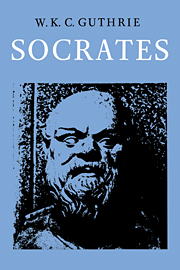II - LIFE AND CHARACTER
Published online by Cambridge University Press: 05 August 2012
Summary
LIFE
Socrates was a native Athenian, son of Sophroniscus and Phaenarete, of the deme Alopeke. He was born in 470 or 469 B.C., for the records of his trial and execution put them in the spring of 399, and plato gives his age as seventy at the time. His father is said to have been a stonemason or sculptor, and references in plato to Daedalus as his ancestor (Euthyphro IIb, Alc. I 121 a) do something to confirm this. As doctors traced their descent to Asclepius as eponymous ancestor (so Parentage and Life ofSocrates Eryximachus in Plato, Symp. 186e), sculptors would naturally trace their line back to Daedalus. The justification for the mythical genealogy is that it was regular Greek practice for a craft to be handed on from father to son. Accordingly it was said that Socrates himself was brought up in the sculptor's craft, which he may have practised in his earlier years (Zeller, Ph. d. Gr. 52, nne 1 and 2), before he ‘deserted it for paideia’ as Lucian later put it (Somn. 12). Sophroniscus seems to have been a respected citizen who could hold up his head in any company, since plato makes Lysimachus son ofAristides speak ofhim as a lifelong friend whom he held in the highest esteem. It is unlikely that he was poor, or that Socrates's later poverty was anything but self-chosen, as plato in the Apology (23b) says it was.
The Peloponnesian War involved him in much active service, and he earned high praise for his courage and coolness, especially in adversity, and his powers of endurance.
- Type
- Chapter
- Information
- A History of Greek Philosophy , pp. 58 - 96Publisher: Cambridge University PressPrint publication year: 1971
- 1
- Cited by



